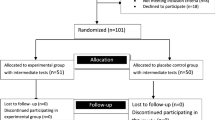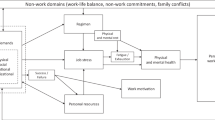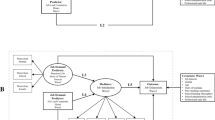Abstract
Purpose
There is limited research on teachers’ psychosocial work environment and mental health, and most has been conducted in predominantly Western countries that share a number of important common characteristics that distinguish them from countries in many other regions of the world. Within the framework of the effort–reward imbalance (ERI) theoretical model, the relationship between the psychosocial work environment and mental health of teachers in the United Kingdom (UK) and Hong Kong (HK) was investigated.
Methods
Full-time qualified teachers from both the UK and HK (N = 259) participated in the research. They were asked to fill in a set of questionnaires that measured their perceived stress, mental health, psychosocial work environment and demographic information.
Results
Perceived stress was found to predict teachers’ mental health. Overcommitment, the intrinsic component of the ERI model, predicted mental health among HK teachers. There were significant differences in the psychosocial variables between UK and HK teachers.
Conclusion
The results showed support for the ERI model and in particular for the relationship between stress and mental health and demonstrated the role of overcommitment in the teaching profession. Some implications are discussed for combating cultural differences in managing the psychosocial work environment of teachers.
Similar content being viewed by others
References
Bailey FJ, Dua J (1999) Individualism-collectivism, coping styles, and stress in international and Anglo-Australian students: a comparative study. Aust Psychol 34(3):177–182. doi:10.1080/00050069908257451
Bellingrath S, Weigl T, Kudielka BM (2009) Chronic work stress and exhaustion is associated with higher allostastic load in female school teachers. Stress 12:37–48. doi:10.1080/10253890802042041
Benmansour N (1998) Job satisfaction, stress and coping strategies among Moroccan high school teachers. Mediterr J Educ Stud 3:13–33
Borg MG (1990) Occupational stress in British educational settings: a review. Educ Psychol 10(2):103–126. doi:10.1080/0144341900100201
British Occupational Health Research Foundation (2005) Workplace interventions for people with common mental health problems: evidence review and recommendations. British Occupational Health Research Foundation, London
Bureau Education (2012) Figures and statistics. Secondary education. The Government of the Hong Kong Special Administrative Region, Hong Kong
Byrne BM (1999) Teacher burnout: the nomological network. In: Vandenberghe R, Huberman AM (eds) Understanding and preventing teacher burnout. Cambridge University Press, New York, pp 15–37
Calnan M, Wadsworth E, May M, Smith A, Wainwright D (2004) Job strain, effort-reward imbalance, and stress at work: competing or complementary models? Scand J Public Health 32:84–93. doi:10.1080/02678370110040920
Chen CH (2000) Effects of support group intervention in postnatally distressed women: a controlled study in Taiwan. J Psychosom Res 49(6):395–399. doi:10.1016/S0022-3999(00)00180-X
Chen CH (2001) Association of work status and mental well-being in new mothers. Kaohsiung J Med Sci 17(11):570–575
Cheng PC, Chang FJ (2010) Relationships among traditional Chinese personality traits, work stress, and emotional intelligence in workers in the semiconductor industry in Taiwan. Qual Quant 44(4):733–748. doi:10.1007/s11135-009-9235-x
Cheung MK (2009) Professional teacher union publications, 555. PTU, Hong Kong
Cheung EYM, Sachs J (2006) Student teachers’ acceptance of a web-based information system. Int J Psychol Orient 49:132–141
Chu LC, Kao HSR (2005) The moderation of meditation experience and emotional intelligence on the relationship between perceived stress and negative mental health. Chin J Psychol 47(2):178–194
Chwalisz K, Kisler V (1995) Perceived stress: a better measure of caregiver burden. Meas Eval Couns Dev 28(2):88–98
Clugston M, Howell JP, Dorfman PW (2000) Does cultural socialization predict multiple bases and foci of commitment? J Manage 26(1):5–30. doi:10.1016/S0149-2063(99)00034-3
Cohen A (2006) The relationship between multiple commitments and organizational citizenship behavior in Arab and Jewish culture. J Vocat Behav 69(1):105–118. doi:10.1016/j.jvb.2005.12.004
Cohen S, Kamarck T, Mermelstein R (1983) A global measure of perceived stress. J Health Soc Behav 24(4):385–396
Cook MO (2000) Nurse executives’ experiences of social support in a managed care environment. Sci Eng 60(9B):4518
de Heus P, Diekstra RFW (1999) Do teachers burn out more easily? A comparison of teachers with other social professions on work stress and burnout symptoms. Cambridge University Press, New York
Farber BA (2000) Treatment strategies for different types of teacher burnout. J Clin Psychol 56(5):675–689. doi:10.1002/(SICI)1097-4679(200005)56:5<675:AID-JCLP8>3.0.CO;2-D
Fava M, Davidson K et al (1996) Hostility changes following antidepressant treatment: relationship to stress and negative thinking. J Psychiatr Res 30(6):459–467. doi:10.1016/S0022-3956(96)00034-9
Gadin KG, Hammarström A (2000) School-related health—a cross-sectional study among young boys and girls. Int J Health Serv 30:797–820
Guglielmi RS, Tatrow K (1998) Occupational stress, burnout, and health in teachers: a methodological and theoretical analysis. Rev Educ Res 68(1):61–99. doi:10.3102/00346543068001061
Hobbs FD et al (2002) Impact of heart failure and left ventricular systolic dysfunction on quality of life: a cross-sectional study comparing common chronic cardiac and medical disorders and a representative adult population. Euro Heart J 23(23):1867–1876. doi:10.1053/euhj.2002.3255
Hofstede G (1986) Culture’s consequences: comparing values, behaviours, institutions and organisations across nations, 2nd edn. Sage, Thousand Oaks
Hofstede G (1991) Cultures and organizations: Software of the mind. Mcgraw-Hill, London
Jenkins S, Calhoun JF (1991) Teacher stress: issues and intervention. Psychol Sch 28:60–70. doi:10.1002/1520-6807(199101)28:1<60:AID-PITS2310280110>3.0.CO;2-B
Karasek RA (1979) Job design, job decision latitude, and mental strain: implications for job redesign. Adm Sci Q 24:285–308. doi:10.1136/jech.57.2.147
Karasek R, Theorell T (1990) Healthy work: stress, productivity, and the reconstruction of working life. Basic Books, New York
Kasl SV (1998) Measuring job stressors and studying the health impact of the work environment: an epidemiologic commentary. J Occup Health Psychol 3(4):390–401
Klassen RM (2010) Teacher stress: the mediating role of collective efficacy beliefs. J Edu Res 103(5):342–350. doi:10.1080/00220670903383069
Kyriacou C (2001) Teacher stress: directions for future research. Edu Rev 53:27–35. doi:10.1080/0013191012003362
Lam CLK, Gandek B et al (1998) Testing of scaling assumptions and construct validity of the Chinese (HK) version of the SF-36 health survey. J Clin Epidemiol 51:1139–1147. doi:10.1136/jech.57.4.259
Laughlin C, Cotton PD (1994) Efficacy of a pre-retirement planning intervention for aging individuals with mental retardation. J Appl Res Intellect 38(3):317–328
Lev EL, Eller LS et al (2004) Quality of life of men treated with brachytherapies for prostate cancer. Health Qual Life Out 2:28. doi:10.4236/jct.2011.24060
Li J, Yang W et al (2005) Effort-reward imbalance at work and job dissatisfaction in Chinese healthcare workers: a validation study. Int Arc Occup Environ Health 78(3):198–204. doi:10.1007/s00420-004-0581-7
Li J, Yang W, Cho SI (2006) Gender differences in job strain, effort-reward imbalance, and health functioning among Chinese physicians. Soc Sci Med 62(5):1066–1077. doi:10.1016/j.socscimed.2005.07.011
Marmot M, Siegrist J, Theorell T (1999) Health and the psycho-social environment at work. In: Marmot M, Wilkinson RG (eds) Social determinants of health. Oxford University Press, Oxford
Mazzola JJ, Schonfeld IS, Spector P (2011) What qualitative research has taught us about occupational stress. Stress Health 27:93–110. doi:10.1002/smi.1386
Morris P, Adamson B et al (1999) Final report: the project on feedback and assessment. Curriculum Development Institute, Hong Kong
Mueller CW, Finley A, Iverson R, Price J (1999) The effects of group racial composition on job satisfaction, organizational commitment, and career commitment: the case of teachers. Work Occup 26(2):187–219. doi:10.1177/0730888499026002003
Niedhammer I, Tek ML et al (2004) Effort-reward imbalance model and self-reported health: cross-sectional and prospective findings from the GAZEL cohort. Soc Sci Med 58(8):1531–1541. doi:10.1111/j.1365-3016.2010.01177.x
Noordin F, Williams T, Zimmer C (2002) Career commitment in collectivist and individualist cultures: a comparative study. Int J Hum Resour Man 13(1):35–54. doi:10.1080/09585190110092785
Office for National Statistic (ONS) (2011) Regional trends online tables, 04: education and training. Office for National Statistic, UK
Parnes HS, Sommers DG (1994) Shunning retirement: work experience of men in their seventies and early eighties. J Gerontol 49(3):117–124
Pithers RT, Soden R (1998) Scottish and Australian teacher stress and strain: a comparative study. Brit J Edu Psychol 68:269–279. doi:10.1111/j.2044-8279.1998.tb01289.x
Russo J, Trujillo CA, Wingerson D, Decker K, Ries R, Wetzler H, Roy-Byrne P (1998) The MOS 36-item short form health survey: reliability, validity, and preliminary findings in schizophrenic outpatients. Med Care 36(5):752–756
Sann U (2003) Job conditions and wellness of German secondary school teachers. Psychol Health 18(4):489–500. doi:10.1080/0887044031000147210
Siegrist J (1996) Adverse health effects of high-effort/low-reward conditions. J Occup Health Psychol 1(1):27–41. doi:10.1037/1076-8998.1
Siegrist J (2000) Place, social exchange and health: proposed sociological framework. Soc Sci Med 51(9):1283–1293. doi:10.1016/S0277-9536(00)00092-7
Stansfeld SA, Fuhrer MJ et al (1999) Work characteristics predict psychiatric disorder: prospective results from the Whitehall II study. Occup Environ Med 56(5):302–307. doi:10.1136/oem.56.5.302
Stansfield SA, Head JRS, Singleton N, Lee A (2003) Occupation and Mental health: secondary analysis of the ONS psychiatric morbidity survey of Great Britain. HSE Books, London
Tang CSK, Au WT et al (2001) Mental health outcomes of job stress among Chinese teachers: role of stress resource factors and burnout. J Organiz Behav 22(8):887–901. doi:10.1002/job.120
Triandis HC (1995) Individualism and collectivism. Westview, Boulder
Tyssen R, Vaglum P, Grønvold NT, Ekeberg Ø (2001) Factors in medical school that predict postgraduate mental health problems in need of treatment: a nationwide and longitudinal study. Med Edu 35(2):110–120. doi:10.1111/j.1365-2923.2001.00770.x
Unterbrink T, Hack A, Pfeifer R, Buhl-Grießhaber V, Müller U, Wesche H, Frommhold M, Scheuch K, Seibt R, Wirsching M, Bauer J (2007) Burnout and effort-reward-imbalance in a sample of 949 German teachers. Int Arch Occup Environ Health 80:433–441. doi:10.1007/s00420-007-0169-0
Van Dick R, Wagner U (2001) Stress and strain in teaching: a structural equation approach. Brit J Edu Psychol 71:243–259. doi:10.1348/000709901158505
Van VN, Bosma H, De Jonge J, Schaufeli W (2005) Reviewing the effort-reward imbalance model: drawing up the balance of 45 empirical studies. Soc Sci Med 60(5):1117–1131. doi:10.1016/j.socscimed.2004.06.043
Ware JE, Snow KK, Kosinski M (1993) SF-36 health survey—manual and interpretation guide. The Health Institute, Boston
Watts J, Robertson N (2011) Burnout in University teaching staff: a systematic literature review. Edu Res 53(1):33–50. doi:10.1080/00131881.2011.552235
World Health Organization (WHO) (2005) Suicide rates, by gender, China, Hong Kong, 1955–2002. WHO, Geneva
Xiao-ming L, Wen-zeng W (2004) A study on teachers’ occupational burnout and mental health. Chin J Clin Psychol 12(4):357–358. doi:10.1002/job.120
Yu CNL (2002) Stress among Seventh-Day Adventist teachers: an analysis of relationships between selected teacher characteristics and occupational stress factors. Hum Soc Sci 63(6A):2081
Conflict of interest
The authors declare that they have no conflict of interest.
Author information
Authors and Affiliations
Corresponding author
Rights and permissions
About this article
Cite this article
Tang, J.J., Leka, S. & MacLennan, S. The psychosocial work environment and mental health of teachers: a comparative study between the United Kingdom and Hong Kong. Int Arch Occup Environ Health 86, 657–666 (2013). https://doi.org/10.1007/s00420-012-0799-8
Received:
Accepted:
Published:
Issue Date:
DOI: https://doi.org/10.1007/s00420-012-0799-8




